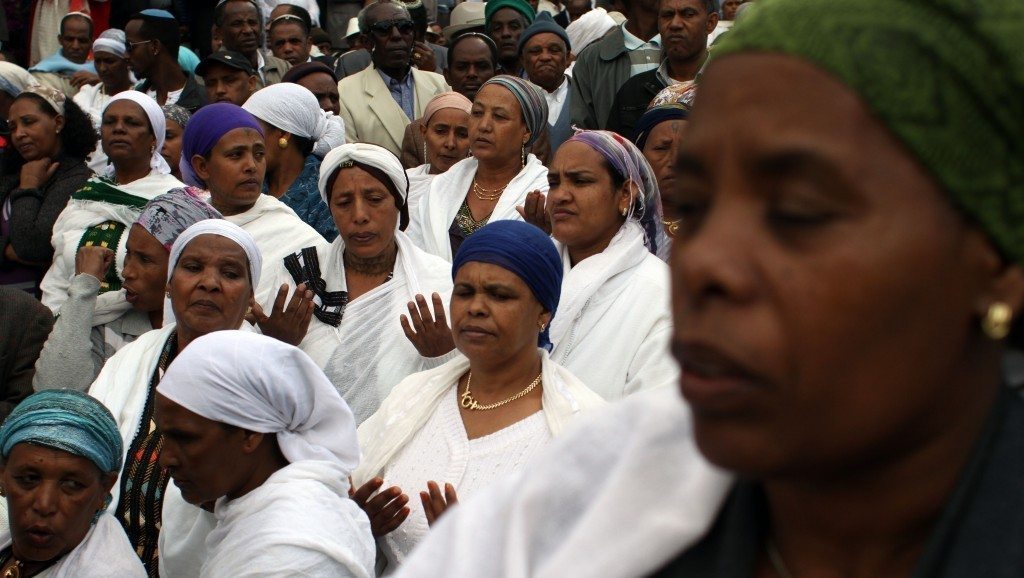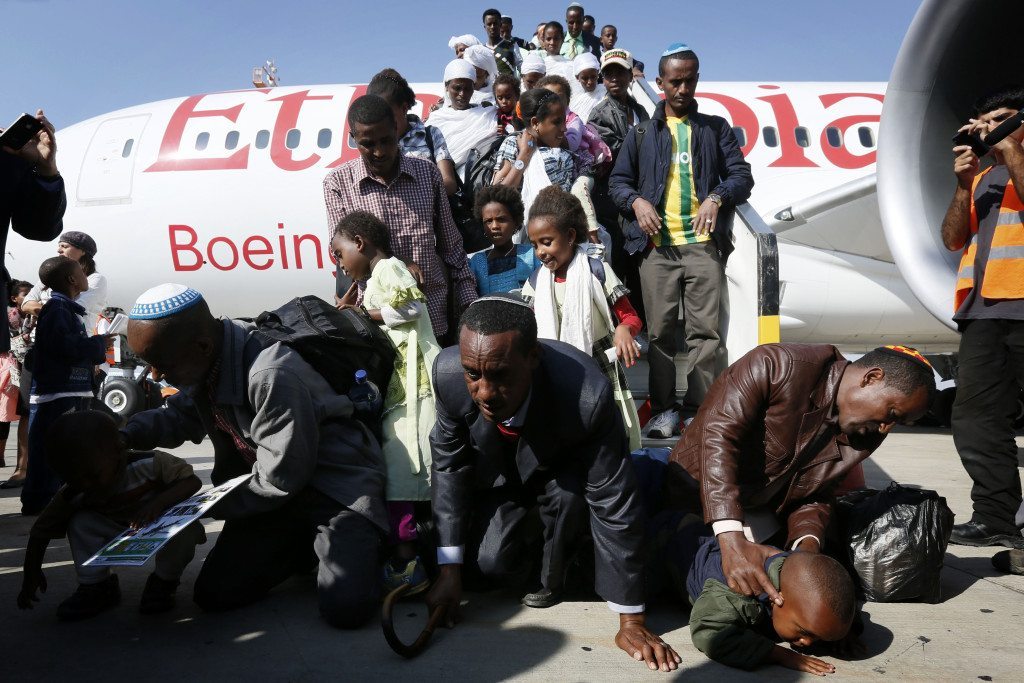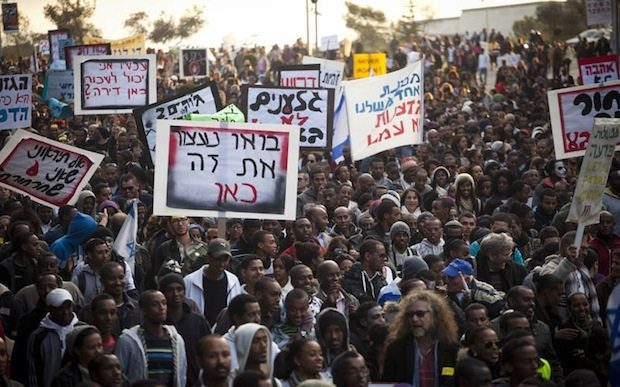Ethiopian Bete Israel/Falasha/Jewish community still suffers trauma in Israel from exodus 30 years ago
WATCH! Racist State of Israel: Ethiopian Jews, Beta Israel suffer religious extinction & genocide again RASTAFARI EXODUS, AFRICA UNITE!
Ethiopian Jews/Falashas/Bete Israel were tricked to relocate to modern state called Israel, when they were already in essence, in The New Jerusalem, Prophetic Motherland Ethiopia the delight of IGZIABIER/LORD GOD of the Universe. Treated worse than animals, not even their blood Ethiopians are allowed to donate, they suffer by tyranny of the racist Israeli state. Psychologically broken, families displaced, this silent genocide, destabilization, mandatory sterilization, rape and horrific holocaust of Ethiopians has gone on for too long. Children of the Motherland in exile throughout the Diaspora are Ancient, Biblical Ethiopians/Israelites. The Royal and Priestly House of Israel and Judah is ETHIOPIA. The WORLD is ETHIOPIA! Ethiopian Hebrews left the land of Promise to go to Israel, where the streets are paved with the blood of the prophets. Who are the True Israelites? InI are! They know this that’s why the call themselves Israeli’s not Israel-ITES!
Although the suffering of many immigrants from Ethiopia in the past 30 years is well documented, treatment for their resulting psychological trauma has been minimal. Psychotrauma certainly isn’t new to the Jewish People. Unspeakable, nightmarish experiences suffered by Holocaust survivors as long as 75 years ago remain fresh in their minds and have been passed on as trauma even to the second and third generations.
The painful experiences of Ethiopian Jewish immigrants are still vivid and raw up to three decades later.
Although many compared themselves to the ancient Israelites on the Exodus from Egypt, Ethiopian Jews weren’t running away; they were courageously pursuing their dream of the idyllic Jerusalem on which their parents had raised them. Yet murder, rape, illness, starvation, robbery and separation from loved ones during the prolonged passage through Sudan to Israel created bitter memories. Once they settled here, poverty, unjustified doubts about their Judaism, discrimination, changed roles and a government establishment often lacking compassion and cultural sensitivity have prolonged the suffering of many. A total of 135,000 Jews of Ethiopian origin – immigrants and their locally-born offspring – are living here and establishing their roots, but the in-between generation of newcomers is the most fragile.
Their cause was taken up by an unlikely team – Prof. Danny Brom, the Netherlands-born psychologist who founded the Israel Center for the Treatment of Psychotrauma of Jerusalem’s Herzog Hospital, and 47-yearold Asher Mekunnet Rahamim, a social worker who left the Gondar region of Ethiopia at the age of 13 and as a social worker pioneered in organizing 40 Herzog psychotrauma groups of his compatriots. It remains the one non-profit organization systematically relieving the anguish of Ethiopian olim with help from professionals of the same background.
“The workshops are run the same way groups of Holocaust survivors have discussed their traumatic experiences,” said Brom, “and they are often discussed by the family at home. The discovery that they are not the only ones to have suffered from traumatic events eases their pain.” The groups, some of which were videoed, meet for about a dozen sessions for three hours at a time.
Academics began to pay attention to the problem, and a thick volume called Social, Cultural and Clinical Aspects of Ethiopian Immigrants in Israel was produced in Hebrew by the Jewish Agency and Ben-Gurion University of the Negev Press. Written by BGU psychiatrist Prof. Eliezer Witztum and Beersheba psychiatrist and hypnotherapist Dr. Nimrod Grisaru, it was also translated into English.
Brom and Rahamim last month organized a day-long conference called “From Ethiopia to Jerusalem: Communal empowerment and Trauma Treatment” at the Kehillat Yedidya Congregation. A gift to the 150 social workers, psychiatrists, psychologists and other participants was a 68-page Hebrew booklet on treating psychotrauma and empowerment of Ethiopian immigrants written by Rahamim, Nili Lavi and Brom.
Although the events that caused trauma in the community have been written about extensively, “The ways of offering [them psychological] help has almost not been investigated,” the three authors wrote. The National Insurance Institute’s fund for special projects and various private foundations supplied funds to help the Kiryat Gat, Ashdod and Jerusalem Municipalities’ welfare departments launch the workshops. The Health Ministry has recently shown willingness to train social workers of Ethiopian origin to work with those in the community who are emotionally stressed; nearly a dozen are expected to work for the health funds when the psychiatric reform transfers responsibility for mental health from the ministry to the health insurers.
RAHAMIM RECALLED that he was born in a village of 250 Jewish families in Gondar and was one of 11 children who grew up on stories of Jerusalem.
“My father was the one of the only people in the village to listen to the radio. He used to collect the news he heard and tell us during the Shabbat meals.”
In 1973, when Asher was five years old, his eldest brother left Ethiopia for Israel in a fishing boat, eventually reaching Eilat; pulling himself up by his bootstraps, he eventually was hired by Israel Aircraft Industries.
Inspired, Asher decided to follow in his brother’s footsteps, but did not tell his parents he was leaving for fear that they would somehow stop him.
A year or two before Operation Moses – the first major aliya of Ethiopians in the winter of 1984/5 – he set off on foot with a group of 63 Jews that included one of his brothers. Arriving in Sudan and poor, Rahamim lived for two-and-a-half years in that country, selling ice lollies and doing odd jobs.
When he finally reached Israel, he enrolled in the Mikve Yisrael boarding school and learned Hebrew, in which he’s now fluent.
“I had been through traumatic events and experiences, but I didn’t have time to get nightmares. I was so busy. I sat in my high school classes – but since I copied from the board so slowly, I was always staying behind after class to get it done. I didn’t understand most of the material, especially the math.”
Although almost all of his family members have settled here, one of his brothers disappeared on the border of Sudan. At the end of 1992, Rahamim completed his active service in the IDF and traveled to Ethiopia and Sudan to look for him, but to no avail.
Rahamim studied mediation and worked in schools around the country to help Ethiopian immigrants.
Requiring tools to really assist them, he decided to study social work at the Hebrew University and worked for the Jerusalem Municipality for five years.
Then a chance encounter with Brom led to a permanent partnership.
“I have worked on the psychotrauma center team since 2006. At first I was asked to cope with suicide in the community, which was extremely rare among Jews in Ethiopia, as was murder of wives. This was the antithesis of life there. There was such protection of women that when the wife was working in the kitchen, the husband stays outside to guard her.
There were fixed boundaries. There is no Jewish community in the world that underwent such a long process before coming to Israel. Their marriages were exposed to many stresses during this waiting period,” said Rahamim. “And one of the major psychological traumas involved conversion, even though then-chief rabbi Ovadia Yosef in 1973 recognized the ‘Falashas’ as Jews.”
Many men, said Rahamim, were not prepared emotionally for the conversion process, including ritual circumcision or a symbolic procedure releasing a few drops of blood and immersion in a ritual bath – even though they already felt Jewish.
Another source of trauma involving the women was rape and the violent loss of loved ones. Without enough water during the journey to Israel, some people drank their own urine.
With no Jewish cemetery in Sudan, when a daughter died, one family buried her in the earthen floor of their home.
“I feel this hole all the time,” he recalled one woman saying. “I arrived in Israel – a great gift – but I have not been freed from remembering where my daughter was buried.”
At workshops, participants were sometimes asked to pick illustrated cards out of a desk.
“One woman chose one showing a man fighting with a lion, who it turned out representing her own husband’s domestic violence.”
As immigrant women were generally more easily integrated into Israeli society and learned Hebrew faster in cleaning and other unskilled jobs than men, males lost the status and honor that they had in Ethiopia, said Rahamim. This led some to lash out at their wives and beat or even murder them or commit suicide – acts unknown in Jewish communities in their native land.
Of 16,000 who arrived via Sudan during Operation Moses, 4,000 died.
More perished during Operation Solomon in 1991 and 1992 and the aliya since the 1990s of Falashmura who had been forced to convert to Christianity.

The conference at Yedidya began with blessings in Amharic by a leading kes, or Ethiopian Jewish priest – with the Hebrew words “Yerushalayim” and the names of the Patriarchs prominent. As a moving example of modernity, a young Ethiopian boy named Avraham performed classical music on his violin.
Brom recalled studies showing that 23 percent of Ethiopian immigrants suffer from post-traumatic stress disorder (PTSD), 2.5 times more than the general Israeli population who periodically experience war and terrorism.
Nearly 80% of those who fit the description of PTSD sufferers are in long-term mourning, said the professor.
Some 80% of the immigrants lost relatives en route to Israel, and some had to bury relatives along the way.
“The price of not talking about their painful experiences is that the memory remains alive as if the events were happening now,” said Brom. “There is difficulty in finding significance. Families have secrets, and they feel confused…The journey from Ethiopia to Jerusealem won’t be completed until we can establish their story of bravery and of distress,” he concluded.
WITZTUM SPOKE at the conference about the lack of expertise among Israeli mental health professionals when it comes to understanding distressed immigrants. They often didn’t seem to speak the same language, and emotional problems emerged as physical complaints in a process called somatization.
“This phenomenon is universal, not only among Ethiopian immigrants. It is common among societies that are less verbal, but there are different types because of the different cultures,” he said.
Traditional healers “treat” Ethiopians for a zar, in which they believe they are possessed by spirits. He also described the “ken-ken syndrome” in which the immigrants complain that insects or worms are in their head or ears and disrupt their concentration and general functioning.
“They fear insects will eat their head from inside. They are reluctant to speak about it, however, as they fear they will be regarded as psychotic or having delusions,” Witztum said.
Sometimes, a traditional healer will actually collect dead insects and worms and persuade the patient that he has removed them from their ears.
They apply alcohol – and the patient believes he has been cured.
“Some patients say they are “running out of air.” While physicians who don’t understand such expressions believe they are asthma cases, in fact the immigrants mean they lack energy. But even if they understand them, doctors have to send them for medical tests to rule out conventional problems.”
Among the cases Witztum described was a 62-year-old married woman with nine children who insisted that she was pregnant because she “felt a fetus moving around in her abdomen.”
When some urine dripped out, she insisted that her “waters broke.”
Psychiatrists thought she was psychotic, but the culturally sensitive professionals, who sent her for blood tests and ultrasound, gave her an antidepressant and sent her to a jacuzzi, which calmed her.
“Sometimes we even sent patients to traditional healers to help.”
SHIRA ASHETO, a young researcher at the Zalman Shazar Center who works with Ethiopians like herself, did her thesis on the subject. She even asked her parents, who brought her to Israel as a young child, why they came despite the suffering on the way and in their absorption.
“My mother immediately said she was not sorry for coming, but my father was silent.”
Every Ethiopian Jew was constantly told as children about the ethereal Jerusalem, that they were in their country only temporarily.
“They thought they were only one step away from Zion, but when they got to Sudan, with all the problems, the deaths, the violence and crime, they realized how difficult it would be… They observed Jewish ritual as much as they could in a Muslim country. Sometimes it cost them their lives. One woman recalled that she was forced to eat non-kosher meat and vomited it all. Since then she has become a vegetarian.”
Source: The Jerusalem Post






